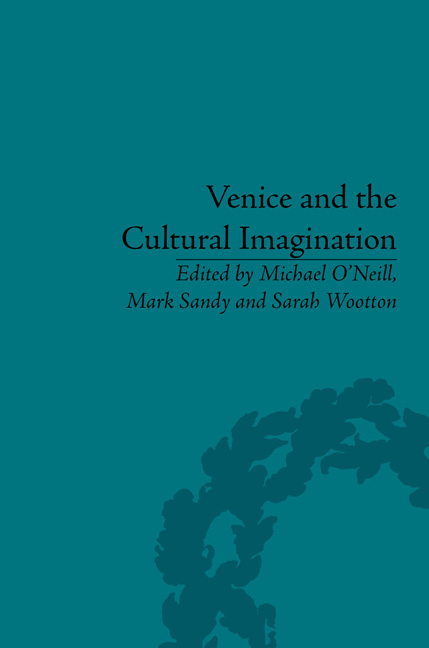Book contents
- Frontmatter
- CONTENTS
- Acknowledgements
- List of Figures
- Notes on Contributors
- Introduction
- 1 A ‘More Beloved Existence’: From Shakespeare's ‘Venice’ to Byron's Venice
- 2 Reimagining Venice and Visions of Decay in Wordsworth, the Shelleys and Thomas Mann
- 3 J. M. W. Turner and the ‘Floating City’
- 4 Venice and Opera: Tradition, Propaganda and Transformation
- 5 Venice, Dickens, Robert Browning and the Victorian Imagination
- 6 ‘The Lamp of Memory’: Ruskin and Venice
- 7 Edith Wharton's ‘Venetian Backgrounds’
- 8 Henry James's Venice and the Visual Arts
- 9 The Myth of Venice in the Decline of Eliot and Pound
- 10 Representations of Venice in Daphne du Maurier's Don't Look Now and Nicolas Roeg's Screen Adaptation
- Notes
- Select Bibliography
- Index
8 - Henry James's Venice and the Visual Arts
- Frontmatter
- CONTENTS
- Acknowledgements
- List of Figures
- Notes on Contributors
- Introduction
- 1 A ‘More Beloved Existence’: From Shakespeare's ‘Venice’ to Byron's Venice
- 2 Reimagining Venice and Visions of Decay in Wordsworth, the Shelleys and Thomas Mann
- 3 J. M. W. Turner and the ‘Floating City’
- 4 Venice and Opera: Tradition, Propaganda and Transformation
- 5 Venice, Dickens, Robert Browning and the Victorian Imagination
- 6 ‘The Lamp of Memory’: Ruskin and Venice
- 7 Edith Wharton's ‘Venetian Backgrounds’
- 8 Henry James's Venice and the Visual Arts
- 9 The Myth of Venice in the Decline of Eliot and Pound
- 10 Representations of Venice in Daphne du Maurier's Don't Look Now and Nicolas Roeg's Screen Adaptation
- Notes
- Select Bibliography
- Index
Summary
Henry James was captivated by Venice for forty years. The city is the setting for some of his more notable shorter fiction, namely The Aspern Papers, and for a substantial section of his novel, The Wings of the Dove. As well as providing inspiration for his fiction, James opens his collection Italian Hours with several essays on Venice; and, even though Italian Hours explores almost twenty cities, the section on Venice constitutes about a quarter of the book's length. These essays, written over a period of thirty years (between 1872 and 1902), celebrate a familiarity with Venice's idiosyncratic beauty. In his longest essay on the city, simply entitled ‘Venice’ (originally published in 1882), James rhapsodizes about the place in uncharacteristically erotic terms: ‘You desire to embrace it, to caress it, to possess it; and finally a soft sense of possession grows up and your visit becomes a perpetual love-affair’.1 However, such adoration is often combined with painful recollections and fears for the future. The city evokes feelings of melancholy and foreboding, as a golden age slips into a past that is only retrievable through reminiscence while tourists taint the vestiges of a former splendour. What emerges as a constant for James is the magnetism of Venice's architecture – with St Mark's as ‘a great hoary shadowy tabernacle of mosaic and marble … an immense piece of Romanticism’ – and, even more importantly, the lasting impression of its art.
- Type
- Chapter
- Information
- Venice and the Cultural Imagination'This Strange Dream upon the Water', pp. 127 - 140Publisher: Pickering & ChattoFirst published in: 2014



